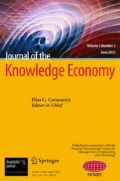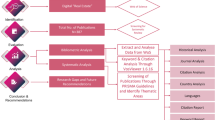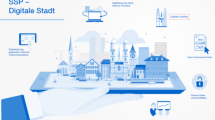Abstract
In the late twentieth century, cities like Manchester, seen as the ‘original, modern’ [1] world industrial city, faced serious challenges in terms of how to respond to the massive economic restructuring that was taking place. On the one hand, Manchester needed to respond to the highest rates of unemployment and social exclusion seen for more than 50 years, whilst, at the same time, the city wanted to develop innovative and practical solutions which could bring real economic and social benefits to local people. The impact of even more rapid technological change, referred to as the emerging ‘information society’, which started to impact from the 1980s onwards, exacerbated this dilemma, accelerating the process of restructuring so that within urban areas new economic growth increasingly sat side by side with extremes of poverty, unemployment and other forms of social exclusion. This case study looks at the ways that Manchester, and key players from the city region, including the public sector, business, education and the community sector, responded to this and how those responses over the past 25+ years created new ambitions and aspirations for the city and its citizens. The conclusions focus on the concept of the ‘Smart City’ and Manchester’s ideas on creating a more inclusive, creative and sustainable city, including through the imaginative use of digital technologies, applications and services, and a commitment to open innovation and the co-production of new and innovative services.
Similar content being viewed by others
Notes
Living Labs grew out of an initiative in 2000, following the ideas of Bill Mitchell at MIT, by Nokia Research Labs, the VTT Finnish National Research Centre and Helsinki City Council to find new ways of trialling and testing ICT products and services through mass participation of users. The University of Salford had long been collaborative partners with VTT and invited Manchester City Council to join a new EU collaborative research project called ‘Intelligent Cities’ in 2001 which was subsequently funded by the EU’s 6th Framework Programme (FP6). As a result of the project, a European Network of Living Labs (ENoLL; www.openlivinglabs.eu) was established in 2006, with the Manchester iving Lab as one of the first 20 members. There are now more than 200 Living Labs in the network.
References
Marketing Manchester (2009) Original, modern. Marketing Manchester publications. http://issuu.com/manchestermagazine/docs/original_modern?viewMode=presentation&mode=embed
European Commission (2010) A digital agenda for Europe. COM (2010) 245 final/2
Komninos N, Schaffers Hans, Pallot M (2011) Developing a policy roadmap for smart cities and the future Internet. In: Cunningham P, Cunningham M (eds) eChallenges e-2011 Conference Proceedings
Fensom S (2011) Internet hub. Unpublished paper
Grant L (2010) Reclaiming East Manchester. NEM
Manchester City Council (2003) Report on establishing the Manchester Digital Development Agency (MDDA). MCC
HM Government (UK) (2005) Connecting the UK: the digital strategy. Prime Minister’s Strategy Unit Joint Report with Department of Trade and Industry (DTI)
Manchester City Council (2007) ONE-Manchester Partnership Digital Challenge Proposal. MCC
Tapscott D, Williams A (2006) Wikinomics. Atlantic Books, London
Anderson C (2006) The long tail. RH Business Books, London
Manchester City Council (2008) Manchester Digital Strategy. MCC
Manchester City Council (2003) Manchester: knowledge capital. MCC
Mitchell W (1999) e-topia: urban life, Jim—but not as we know it. MIT Press, Cambridge
FIREBALL Project (2011) D3.2 Smart city roadmap (Interim Report). MCC
Manchester City Council (2011) Green Paper: Smart Cities—Creating an Inclusive and Sustainable Knowledge Society: A Local Digital Agenda for Manchester (Consultation Draft). MCC
Author information
Authors and Affiliations
Corresponding author
Rights and permissions
About this article
Cite this article
Carter, D. Urban Regeneration, Digital Development Strategies and the Knowledge Economy: Manchester Case Study. J Knowl Econ 4, 169–189 (2013). https://doi.org/10.1007/s13132-012-0086-7
Received:
Accepted:
Published:
Issue Date:
DOI: https://doi.org/10.1007/s13132-012-0086-7




